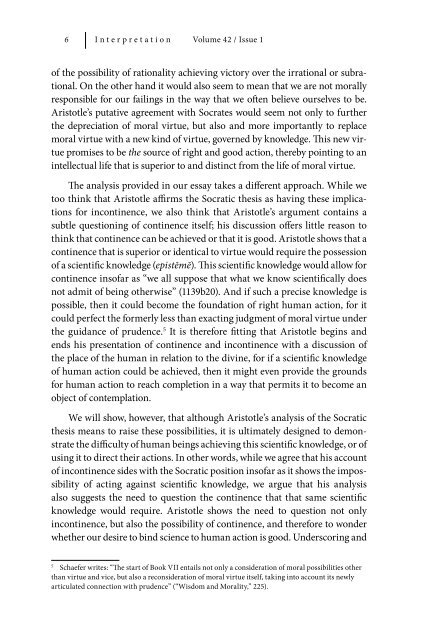Fall 2015
Vol_42_1
Vol_42_1
- No tags were found...
Create successful ePaper yourself
Turn your PDF publications into a flip-book with our unique Google optimized e-Paper software.
6 I n t e r p r e t a t i o n Volume 42 / Issue 1<br />
of the possibility of rationality achieving victory over the irrational or subrational.<br />
On the other hand it would also seem to mean that we are not morally<br />
responsible for our failings in the way that we often believe ourselves to be.<br />
Aristotle’s putative agreement with Socrates would seem not only to further<br />
the depreciation of moral virtue, but also and more importantly to replace<br />
moral virtue with a new kind of virtue, governed by knowledge. This new virtue<br />
promises to be the source of right and good action, thereby pointing to an<br />
intellectual life that is superior to and distinct from the life of moral virtue.<br />
The analysis provided in our essay takes a different approach. While we<br />
too think that Aristotle affirms the Socratic thesis as having these implications<br />
for incontinence, we also think that Aristotle’s argument contains a<br />
subtle questioning of continence itself; his discussion offers little reason to<br />
think that continence can be achieved or that it is good. Aristotle shows that a<br />
continence that is superior or identical to virtue would require the possession<br />
of a scientific knowledge (epistēmē). This scientific knowledge would allow for<br />
continence insofar as “we all suppose that what we know scientifically does<br />
not admit of being otherwise” (1139b20). And if such a precise knowledge is<br />
possible, then it could become the foundation of right human action, for it<br />
could perfect the formerly less than exacting judgment of moral virtue under<br />
the guidance of prudence. 5 It is therefore fitting that Aristotle begins and<br />
ends his presentation of continence and incontinence with a discussion of<br />
the place of the human in relation to the divine, for if a scientific knowledge<br />
of human action could be achieved, then it might even provide the grounds<br />
for human action to reach completion in a way that permits it to become an<br />
object of contemplation.<br />
We will show, however, that although Aristotle’s analysis of the Socratic<br />
thesis means to raise these possibilities, it is ultimately designed to demonstrate<br />
the difficulty of human beings achieving this scientific knowledge, or of<br />
using it to direct their actions. In other words, while we agree that his account<br />
of incontinence sides with the Socratic position insofar as it shows the impossibility<br />
of acting against scientific knowledge, we argue that his analysis<br />
also suggests the need to question the continence that that same scientific<br />
knowledge would require. Aristotle shows the need to question not only<br />
incontinence, but also the possibility of continence, and therefore to wonder<br />
whether our desire to bind science to human action is good. Underscoring and<br />
5<br />
Schaefer writes: “The start of Book VII entails not only a consideration of moral possibilities other<br />
than virtue and vice, but also a reconsideration of moral virtue itself, taking into account its newly<br />
articulated connection with prudence” (“Wisdom and Morality,” 225).


